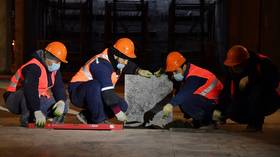Throwing in the trowel: As construction demand booms, Russia short 1.2mn builders after migrants left during Covid pandemic

With record numbers of skyscrapers built in Moscow last year, Russia is breaking ground on a vast number of construction projects. But officials warn pandemic restrictions on migrant workers are creating a crisis for the industry.
At least 1.2 million employees are needed to plug gaps in the construction workforce, Minister of Construction, Housing and Utilities Irek Fayzullin told reporters on Tuesday. "There is a personnel problem,” he said. “A large number of builders who came from the near-abroad [former Soviet states] were forced to leave due to the coronavirus.”
“We usually import builders ourselves,” the minister said, “but a complex mechanism to ensure they continue to arrive is still being worked out.”
Fayzullin’s ministry revealed late last year that, as of the start of December, 50 out of 77 regions across the country lacked sufficient migrant workers at construction sites. This was seen as a consequence of a tough ban on border crossings for citizens of Central Asian countries like Uzbekistan, Tajikistan, and Kazakhstan. The restrictions for all but a small number of exempt professionals were introduced in March 2020 as part of efforts to halt the spread of Covid-19.
Also on rt.com Transparency & unification: Putin envisions new migration and citizenship policies, initiates reformAlso last December, the Ministry of Internal Affairs estimated that almost half of all migrants living in the country had left during the pandemic, with only around six million foreign workers – compared with as many as 11 million in normal times. Moscow, which saw a 40 percent drop in overseas workers, reported that vacancies for taxi drivers and couriers had risen by close to 85 percent, while empty roles for builders had surged by 30 percent.
At the same time, however, research published in the Current History journal last year argued that, “although Russian business elites generally welcome this cheap labor source, the government has deferred to, and at times encouraged, xenophobic popular sentiment.” As a result, they claim, the pandemic is only one barrier to harnessing migrant workforces from Central Asia, with some workers – particularly those without immigration documents – reporting exploitation and discrimination.
Despite this, authorities have taken steps to attract and retain foreign workers, particularly those from former Soviet Republics. In March last year, the Kremlin slammed the system used for registering workers, with a position statement arguing that “standing migration rules are not clear and unified enough. The level of digitalization in the fields of government services and state control of migration remains low.” A proposed new migration policy is intended to create a favorable environment for Russian-speaking foreigners, as well as people who have a “similar mentality and culture.”
Lower numbers of new immigrants have compounded Russia’s population problems, already hit by a falling birth rate. As a result, the number of people living permanently in the country fell by more than half a million over the space of just 12 months last year.
Also on rt.com Russia's population decline accelerated in 2020, losing 500,000 residents amid Covid deaths, falling birth rate & less immigrationDependence on migrant labor, however, has not always been uniformly popular. Jailed opposition activist Alexey Navalny was known for regular appearances at an annual nationalist ‘Russian March’ that championed slogans like “Russia for the Russians,” as well as arguing in favor of a visa regime with Central Asia that would potentially restrict the influx of workers.
Vladimir Zhirinovsky, leader of the right-wing LDPR party, has also championed anti-migrant sentiment among the public, arguing that workers from European ex-Soviet Republics were far preferable to those from other parts of the former USSR. “Bulgarians, Ukrainians, Belarusians, Serbs, this is possible. From Central Asia – that's impossible," Zhirinovsky said. “The [migrants] carry two grams of drugs in their pockets for personal consumption. But they will sell it here. That's why you can't bring in migrants. Let them go – that's good.”
President Vladimir Putin, however, has championed the influx of workers from the region, and has generally sought to recreate the idea of a multi-ethnic nation that prevailed during the Soviet era. In February, he turned fire on “caveman nationalism, with slogans that claim Russia is only for Russians.” This, he argued, “only harms Russians, only harms Russia.”
Unsurprisingly, the world’s largest country is already made up of a vast array of ethnic groups, from Muslim Tatars along the Volga to Finnic Samis in the frozen far north. The mass deportations, resettlements and influx to major cities that took place under Communist rule fundamentally reshaped the demographics of the country and fueled an industrial revolution. Now, though, against the backdrop of the pandemic, it appears that much of that movement has slowed, leaving some of Russia’s key business sectors struggling to make up the shortfall.
Also on rt.com Putin slams ‘caveman nationalism’ as detrimental to Russia, says every ethnicity should feel respected & at home in the countryThink your friends would be interested? Share this story!















